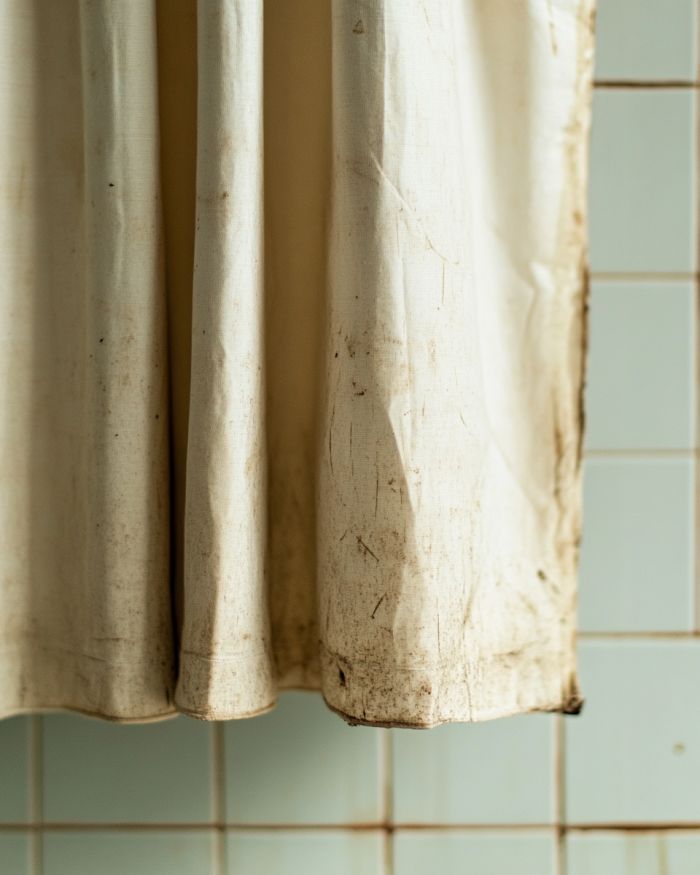What’s the best way to clean a shower curtain? I can’t afford to keep changing it, and it’s so embarrassing when people come over

For minor stains and spots, make a paste using baking soda and water. Apply this paste to the stained areas and gently scrub with a toothbrush or a soft sponge. Rinse thoroughly with warm water. For persistent stains, you can use a mixture of white vinegar and water sprayed directly onto the affected areas, letting it sit for a few minutes before rinsing.
Machine Washing Your Shower Curtain
Many shower curtains, particularly fabric and some polyester ones, can be machine-washed. Use a gentle cycle with warm water and add a small amount of mild detergent. For added cleaning power, you can throw in a couple of towels which will help scrub the curtain. Avoid using bleach unless your curtain is white and it is explicitly recommended by the manufacturer.
Hand Washing Methods
If your shower curtain is not machine washable, hand washing is a suitable alternative. Fill a bathtub or a large basin with warm water and add a small amount of mild detergent. Submerge the curtain in the water and use a sponge or soft brush to scrub it gently, paying extra attention to stained areas. Rinse thoroughly with cold water to remove any soap residue.
Dealing with Mold and Mildew
Mold and mildew require stronger measures. Mix equal parts water and white vinegar in a spray bottle and apply it to the moldy areas. Let it sit for 10-15 minutes, then scrub with a brush until the spots fade. Rinse thoroughly. For extreme cases, you can use a solution of one part bleach to four parts water, ensuring proper ventilation and protective gloves during application.
Drying and Reinstalling Your Shower Curtain
After cleaning, shake off excess water and hang the curtain back on its rod to dry. Spread it out as much as possible to prevent mildew from forming while it dries. If your curtain is machine-washable, you can also tumble dry it on a low heat setting, but be sure to check the care instructions.
Preventive Measures to Keep Your Shower Curtain Clean
To keep your shower curtain clean for longer, consider rinsing it with water after every shower to remove soap and shampoo residues. Ensure your bathroom is properly ventilated to reduce humidity and prevent mold growth. Occasionally spraying your curtain with a mix of vinegar and water can also help ward off mildew.
Choosing the Right Cleaning Products
When selecting cleaning products, opt for mild detergents and avoid harsh chemicals that can damage the material. Products containing vinegar, baking soda, or hydrogen peroxide are usually effective and less likely to cause harm. Always test a small area first if you are unsure about the compatibility of a cleaning product with your curtain’s material.
Eco-Friendly Cleaning Alternatives
Consider using environmentally friendly cleaning methods to reduce your impact on the environment. Natural ingredients like vinegar, baking soda, lemon juice, and essential oils can effectively clean and deodorize your shower curtain without harmful chemicals. These alternatives are not only better for the environment but also safer for your family.
When to Replace Your Shower Curtain
Despite your best efforts, there will come a time when your shower curtain will need to be replaced. If it has persistent stains, significant mold growth, or an unpleasant odor that won’t go away, it may be time for a new curtain. Regular cleaning and proper maintenance can extend the life of your curtain, but materials do degrade over time
Conclusion
Cleaning your shower curtain doesn’t have to be a stressful or expensive task. With the right methods and a little effort, you can keep your curtain looking fresh and clean. Regular maintenance and adopting preventive measures will ensure that your shower curtain remains an attractive and hygienic part of your bathroom for as long as possible, saving you from the embarrassment and expense of frequent replacements.
Leave a comment
Leave a comment










